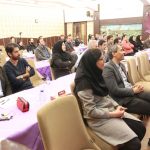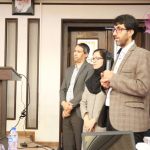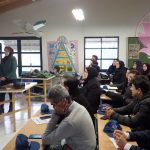Joint seminar and exhibition between Anzali Wetland Ecological Management Project Phase II(AWEMP2) and Conservation of Iranian Wetlands Project Phase II(CIWP2) was held to share both experiences on 26th Feb 2019 at the Kadus Hotel in Rasht. 30 CIWP members from 16 provincial DOE, DOE HQ and Ramsar Regional Center attended. In addition, 27 AWEMP2 members from Gilan province participated.
CIWP2 is a UNDP project to enhance the sustainability of Iran’s wetland protected areas and conserve its globally-significant biodiversity. It will do so by establishing ecosystem-based wetland management plans and inter-sectoral coordination structures for 15 important Iranian wetlands. The project is granted Japan government.
Dr. Karimi, Manager of Wetland Ecosystems Office of DOE HQ, remarked the opening speech.
Mr. Aoki, chief advisor of JET, had a speech about the purpose of the joint seminar.
In morning session, 4 presentations of CIWP2 were conducted as followings,
- Abesht, national project manager of the CIWP2, introduced the applying ecosystem approach in developing wetland’s integrated management plans.
- Falsafi, CIWP2 coordinator, explained “Lake Urmia restoration via local community participation in establishment of sustainable agriculture and biodiversity conservation” project.
- Ahmadi, CIWP2 coordinator, explained installation of wetland online monitoring stations.
- Falsafi explained payment for ecosystem services.
In afternoon session, 4 presentation of AWEMP2 were conducted as followings,
- Aoki introduced AWEMP.
- Watanabe, expert of wetland ecosystem conservation and environmental education of JET, explained the challenges on wetland ecosystem conservation.
- Amooei, ecotourism coordinator of JET, explained development of community-based ecotourism.
- Roshani, environmental education expert of DOE Gilan, explained experience-based environmental education in Anzali Wetland Environmental Education Center(AWEEC).
In addition, CIWP2 and AWEMP2 exhibited many panels, posters and published materials of the activities and showed videos in front of the seminar room.
Study tour was implemented on second day, 27th Feb.
At first, participants went to AWEEC in Selkeh Wildlife Refuge. They experienced the experience-based education facilities and equipment.
Secondarily they went to Anzali Wetland Ecotourism Center in JBK village to study about community-based ecotourism activity.
At last, they went to waste station and study about village-based waste management activity in the DSS village.
There are many good practices and experiences for wetland conservation of both projects. We hope the wetland conservation will be promoted widely based on such good practices and experiences in Iran.






























